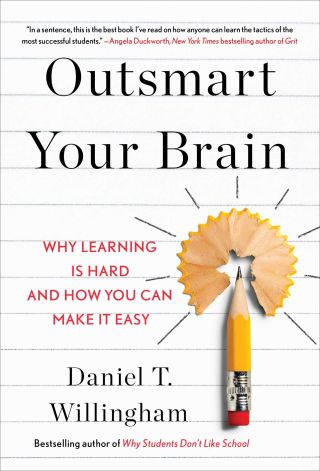Procrastination
8 Strategies to Conquer Procrastination
A new book on study tips helps you “outsmart your brain.”
Posted February 16, 2023 Reviewed by Vanessa Lancaster
Key points
- In Outsmart Your Brain, Daniel Willingham provides tips based on research largely from cognitive science and educational research.
- To defeat procrastination, focus on a small goal you can achieve and go from there.
- Another strategy to avoid procrastination is finding cues and contexts that will help trigger you to do your work automatically.

Usually, our brains are on our side. But not always. In Outsmart Your Brain, Daniel T. Willingham provides a huge number of tips based on research largely from cognitive science and educational research that would be a useful read for any high school or college student as well as their teachers or professors.
One chapter may be especially useful. It is on how to defeat procrastination. Willingham explains that we often procrastinate to help make ourselves feel better in the moment, and that sometimes comes down to impulse control. He explains the ultimate strategy to defeat procrastination: “The hard part is consistently avoiding procrastination until you get to the point of work feeling like a habit.”
1. “Don’t rely on willpower to reduce procrastination. Rely on habit.”
We do a lot of things on autopilot, like making our coffee in the morning. We could experiment, but that might create crappy coffee most of the time. So we just do it the way we’re used to. So basically, we don’t procrastinate because we’re not really choosing. It’s already habit. Willingham suggests you pick a set time in which you will work each day and stick to it. Find cues that will help trigger you to automatically do that work. And find contexts, like quiet study areas free from distractions.
2. “Each to-do list item should be concrete and take twenty to sixty minutes.”
Ambitious goals sound nice, but they are almost always too scary to contemplate. So, Willingham says to focus on a small goal you can actually achieve and then go from there. Create a to-do list, and each item should be 20 to 60 minutes. Think about your larger task as smaller tasks with phases or parts.
3. “Reframe your choice.”
Willingham writes:
Suppose you’re a college student, it’s Thursday night, and your roommate asks if you want to watch a movie. You were thinking you’d work on a chemistry problem set that’s due Monday…choosing the movie carries an opportunity cost you might not have considered: if you go to the movie, you will not have the satisfaction of finishing the problem set.
Thus, Willingham suggests reframing your choice by describing it to yourself in a way that makes the opportunity cost clear and focuses on the part of the task that you are more likely to do.
4. “Just start, and you’ll see it’s not that bad.”
Oftentimes, our emotions or fear of failing at the task or the task being scary is what stops us from even starting. But we find that once we start the task, it really isn’t that bad. Willingham writes: “try telling yourself, ‘I’ll make my to-do list for today. If, after I make my to-do list, I want to take a break, I’ll take a break.’” But, he notes that you really have to be willing to take a break.
5. “Tell others what you’re up to.”
We’re pretty social, and we care about what others think of us. So, it turns out shame actually works to keep us accountable. So, if we tell our friends that we are going to work on something, our friends can also provide positive support. So maybe participate in a study group or think about what friends will hold you accountable and in what ways are most productive for you.
6. “Consider whether your procrastination is a way to self-handicap.”
Practice makes progress, but not necessarily perfect. We tend to think that if we study hard but don’t do well on a test, this makes us feel bad about our brains. And so we self-handicap or give ourselves an excuse so we can have an excuse in case we fail. Try to overcome this by recognizing this is what you’re doing.
7. “Make the temptation a reward.”
Willingham says this strategy should be a last resort. As he writes, “If an activity is so tempting that it will make you skip your work session altogether, make that activity a reward for work completed.”
8. “Track your progress but ignore your streaks.”
The key here is actually to work at the planned time each day. Then, keep track of yourself doing this, like putting a sticker on your calendar each day to help yourself feel good about that accomplishment, no matter how small. Willingham says don’t worry about fixating on keeping your streak going.
References
Willingham, D. T. (2023). Outsmart your brain: Why learning is hard and how you can make it easy. Gallery Books.


